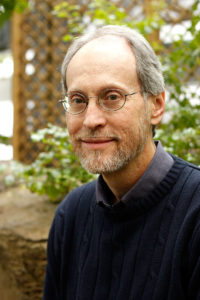Bio
 Lee Martin is the Pulitzer Prize Finalist author of The Bright Forever, and seven other novels: The Evening Shades, The Glassmaker’s Wife, Quakertown, River of Heaven, Break the Skin, Late One Night, and Yours, Jean. His other books are the memoirs, Gone the Hard Road, Such a Life, From Our House, and Turning Bones; and the short story collections, The Least You Need to Know and The Mutual UFO Network. He’s also the author of a craft book, Telling Stories: The Craft of Narrative and the Writing Life. His fiction and nonfiction have appeared in such places as Harper’s, Ms., The Best American Essays, The Best American Mystery Stories, Creative Nonfiction, The Georgia Review, The Kenyon Review, Fourth Genre, River Teeth, The Southern Review, Prairie Schooner, and Glimmer Train. He is the winner of the Mary McCarthy Prize in Short Fiction and fellowships from the National Endowment for the Arts and the Ohio Arts Council. He teaches in the MFA Program at The Ohio State University, where he was the winner of the 2006 Alumni Award for Distinguished Teaching.
Lee Martin is the Pulitzer Prize Finalist author of The Bright Forever, and seven other novels: The Evening Shades, The Glassmaker’s Wife, Quakertown, River of Heaven, Break the Skin, Late One Night, and Yours, Jean. His other books are the memoirs, Gone the Hard Road, Such a Life, From Our House, and Turning Bones; and the short story collections, The Least You Need to Know and The Mutual UFO Network. He’s also the author of a craft book, Telling Stories: The Craft of Narrative and the Writing Life. His fiction and nonfiction have appeared in such places as Harper’s, Ms., The Best American Essays, The Best American Mystery Stories, Creative Nonfiction, The Georgia Review, The Kenyon Review, Fourth Genre, River Teeth, The Southern Review, Prairie Schooner, and Glimmer Train. He is the winner of the Mary McCarthy Prize in Short Fiction and fellowships from the National Endowment for the Arts and the Ohio Arts Council. He teaches in the MFA Program at The Ohio State University, where he was the winner of the 2006 Alumni Award for Distinguished Teaching.
Lee was born in southeastern Illinois, where his father farmed eighty acres in Lawrence County’s Lukin Township. The gravel road that went past the lane to the Martin home, was the road that divided Lawrence County from Richland County, and Lee was amazed as a young boy by the fact that simply walking across the road could move him from one county to the next. In 1963, when he was eight, those gravel roads that ran straight and formed right angles when they intersected moved him to the “hard roads”—first the blacktop into Sumner, and then U.S. Route 50 and Illinois Route 49—heading north to the family’s new home during the school year in Oak Forest, a southern suburb of Chicago, where his mother had accepted an offer to teach third grade for Arbor Park School District #145. Just like that, the familiarity of the two-room Lukin School, the small Berryville Church of Christ, and the shops and cafes of Sumner, was replaced by the strangeness of urban living.
Although the family returned to the farm for holidays and summer vacation (and finally moved back downstate when Lee started high school), he never lost the feeling of being caught between cultures—an experience repeated time and time again through his adult years when he was a nomad in academia for a good while, living and teaching (and always writing!) in Evansville, Indiana; Fayetteville, Arkansas; Athens, Ohio; Memphis, Tennessee; Lincoln, Nebraska; Harrisonburg, Virginia; and Denton, Texas. He now lives in Grove City, Ohio, with his wife, Cathy, and their orange tabby, Stella the Cat.
Among his students at Ohio State, he’s known for his collection of wind-up toys—a collection that keeps growing as more and more people present him with additions. He insists that each one has a pedagogical purpose, and, therefore, an important place in the classroom, where he invites students to not take themselves too seriously. His favorite quote about writing, which he passes on in each class he teaches, comes from Isak Dinesen, who said, “Write a little every day, without hope, without despair.”
A high school basketball player, he’s never lost his appreciation of the sport, and he admits to owning a basketball and going to the playground each spring to see if he still has a jump shot. A lifelong New York Yankees fan from his childhood when the Yankees of Mantle, Maris, Ford, and Berra were often on the CBS Game of the Week (he can still hear Dizzy Dean calling him “podnah,” and breaking into a chorus of “The Wabash Cannonball”), he longs to finally attend a game at Yankee Stadium.
He refuses to accept the cancellation of “Seinfeld,” believing instead he’ll one day find himself transported to a bizarro world where he’ll become friends with Jerry, George, Kramer, and Elaine.
Before landing a job teaching creative writing, he worked in a shoe factory, a garment factory, a tire repairs manufacturing plant, a department store. He earned money umpiring men’s slow-pitch softball games, gathering addresses for the U.S. Census Bureau, delivering pizzas, detasseling corn for the Dekalb Seed Corn Company, flipping burgers at Hardees, and working on a Christmas Tree Farm. Through all those jobs, he kept writing. If that’s what gives you pleasure, he hopes you will, too.
